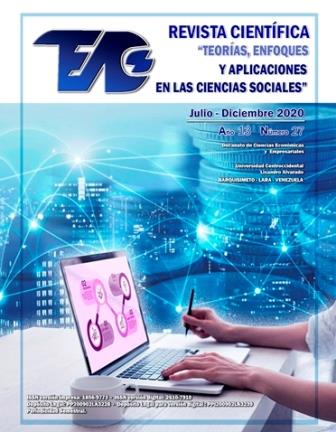The Fiscal deficit in Ecuador and its repercussion on health service expenditure. Period 2015-2018
Keywords:
deficit, fiscal, impact, investment, spending, health, EcuadorAbstract
This study addresses and analyzes the impact of the fiscal deficit with respect to spending on services and expenditures considered as health investment in Ecuador during the period 2015–2018, based on the budgetary evolution assigned to said sector, taking into account the two last presidential administration periods in the country and their changes in fiscal policies. The basis of the study is the compilation of documentary, statistical and qualitative information. The methodologies used are exploratory and descriptive, due to their scientific relevance and applicability in this work. As a main result, it is determined that the State, has not yet managed to fully guarantee the right to health, faithfully complying with the parameters of gratuitousness and universality, despite the deployment of great efforts and elaboration of macro social plans, shows that if significant development progress has been made in health, however, this has not been done in a sustainable way; This is where the fiscal deficit tends to increase the size of the fiscal gap. Faced with this situation, the State requires the reform of an Economic Program in a holistic context, which, within the framework of a dollarized economy, seeks to achieve a fiscal balance to maintain a coherent, harmonious economic system that translates into health as a sustainability axis to achieve faithful compliance with the parameters of the state that guarantees constitutional rights in force since 2008, free and universal.
Downloads
References
BBC. (10 de 10 de 2019). Crisis en Ecuador: Lenín Moreno vs. Rafael Correa, los antiguos aliados cuya enemistad divide al país. Obtenido de https://www.bbc.com/mundo/noticias-america-latina-49987257
BCE. (10 de 2019). Información Estadística Mensual No. 2012 - Octubre 2019. Obtenido de https://contenido.bce.fin.ec/home1/estadisticas/bolmensual/IEMensual.jsp
Cámara de Coemrcio de Guayaquil. (2019). La deuda pública se duplicó en los últimos 10 años. Obtenido de http://www.lacamara.org/website/wp-content/uploads/2018/02/Entorno-economico-ccg.pdf
Hernández, R., Fernández, C., & Baptista, P. (2014). Metodología de la Investigación. México DF: McGRAW-HILL.
OCDE. (2010). Panorama de la salud 2007 Los indicadores de la OCDE: Los indicadores de la OCDE.OECD Publishing.
OECD. (2017). “General government fiscal balance”, in Government at a Glance 2017.Paris: OECD Publishing.
OECD. (2018). erspectivas económicas de América Latina 2018 Repensando las instituciones para el desarrollo: Repensando las instituciones para el desarrollo. OECD Publishing.
Paz, G. M. (2014). Estructura Socioeconómica de México: Cambios y crisis de la nación. México: Grupo Editorial Patria.
Restrepo, J. C. (2015). Hacienda Pública: 10 Edición. Universidad Externado.
Revista Expansión. (01 de 2019). Ecuador - Gasto público. Obtenido de https://datosmacro.expansion.com/estado/gasto/ecuador
Univision. (11 de 07 de 2018). Rafael Correa y Lenin Moreno: los tres motivos que les llevaron de la alianza al divorcio en la presidencia de Ecuador.
Obtenido de https://www.univision.com/noticias/america-latina/rafael-correa-y-lenin-moreno-de-la-alianza-al-divorcio-en-la-presidencia-de-ecuador
Vizcaíno, A. A. (2016). Los Impuestos al Consumo como Principio de Política Fiscal. Editorial Themis.
Published
How to Cite
Issue
Section
Derechos del/de autor/es a partir del año de publicación
Esta obra está bajo la licencia:
Creative Commons Reconocimiento-NoComercial-CompartirIgual 4.0 Internacional (CC BY-NC-SA 4.0)
Las opiniones expresadas por los autores no necesariamente reflejan la postura del editor de la publicación ni de la UCLA. Se autoriza la reproducción total o parcial de los textos aquí publicados, siempre y cuando se cite la fuente completa y la dirección electrónica de esta revista. Los autores(as) tienen el derecho de utilizar sus artículos para cualquier propósito siempre y cuando se realice sin fines de lucro. Los autores(as) pueden publicar en internet o cualquier otro medio la versión final aprobada de su trabajo, luego que esta ha sido publicada en esta revista.



